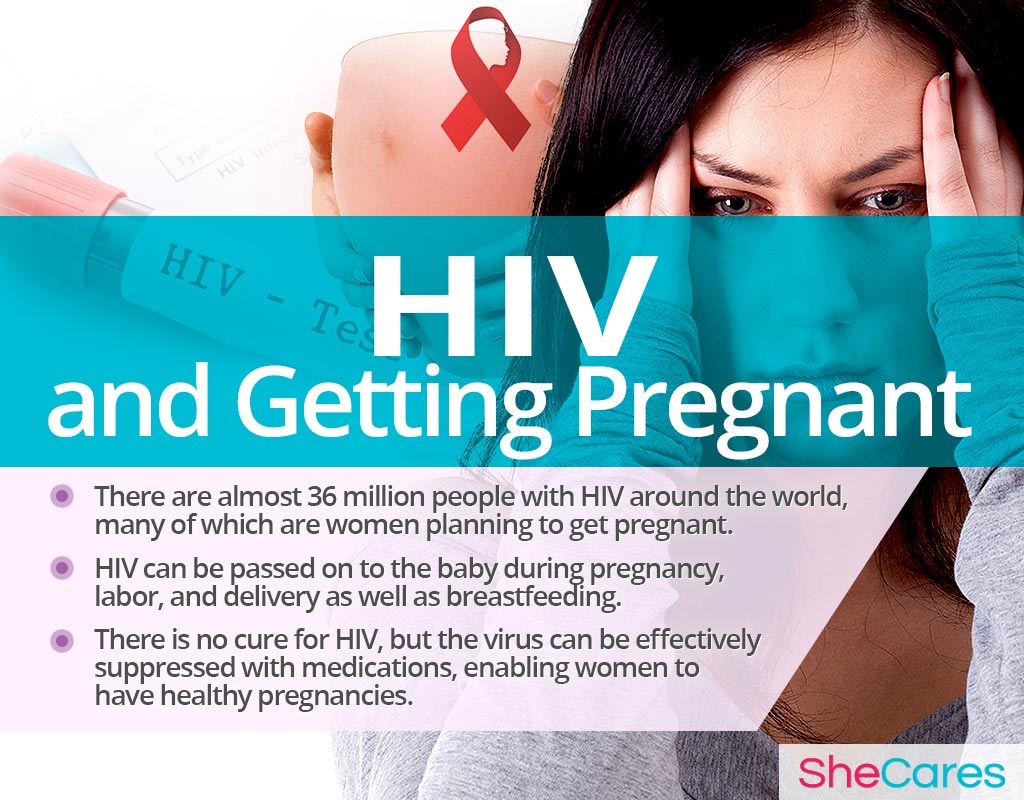Brief Overview of HIV
Human Immunodeficiency Virus (HIV) infects the immune system, compromising its defense mechanism responses, such as fighting infections, and eventually leading to its total impairment. AIDS, short for an acquired immunodeficiency syndrome, is an advanced stage of HIV infection.
HIV can be transmitted through certain body fluids during sex and blood transfusion as well as pregnancy, delivery, and breastfeeding. An HIV test during pregnancy is becoming a part of routine prenatal testing around the world. Currently, there is no cure for HIV and AIDS, but an antiviral treatment (ART) can effectively prevent the virus from reproducing in the body, thus lowering the risk of complications and extending one's life expectancy.
Possible Effects of HIV on Pregnancy
Effects of HIV on Fertility
Although science does not fully understand the exact causal relationship of HIV and fertility, HIV positive women tend to:
Have lower fertility rates possibly due to weakened immunity, prolonged stress, or weight loss among other suspected causes.
Have anovulatory cycles, which means the egg is not released by the ovaries, resulting in infertility.
Delay conception in fear of virus transmission to the child, which can potentially shorten their fertility window.
Suffer from infertility as a side effect of ARTs.
Effects of HIV on Mother and Baby
The main concern of HIV in pregnancy is the mother-to-child transmission of the virus, also known as perinatal HIV transmission. It can occur at any point during pregnancy, labor and delivery as well as breastfeeding. Without medications, 15% to 45% of pregnant women pass down the virus to their infants.
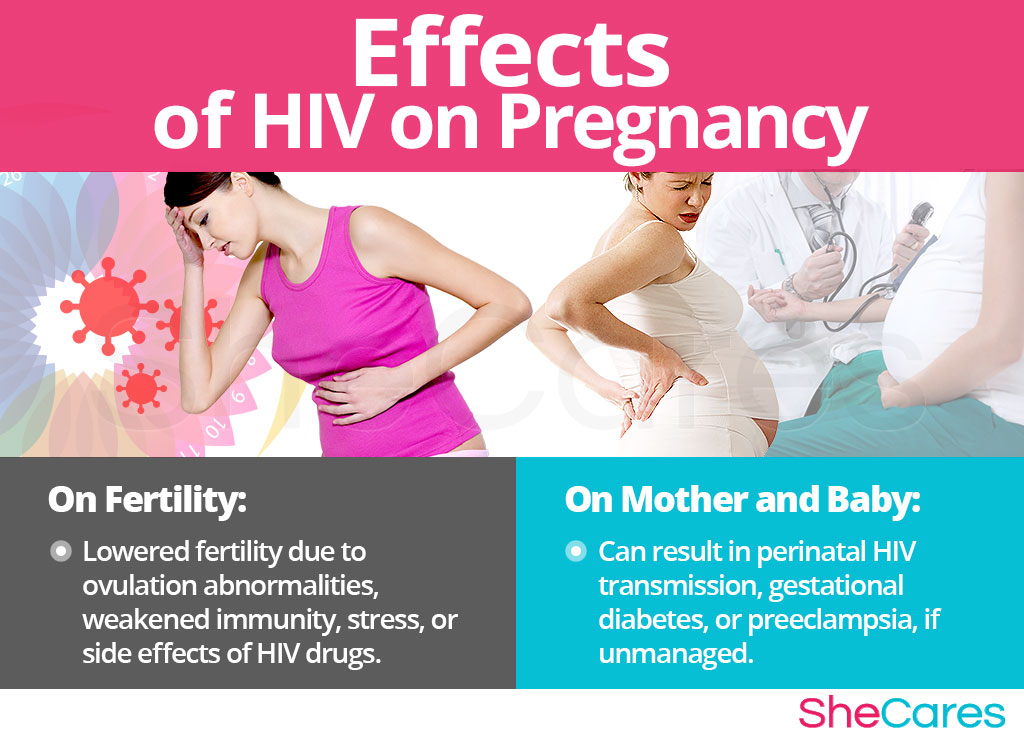
Risks and Complications
Unmanaged HIV positive pregnancy can result in potentially serious complications, such as gestational diabetes, preeclampsia, or preterm contractions.
Action Plan
Normally, the placenta provides a good protection against HIV and prevents it from infecting the fetus. Lowering the risk of infections and eliminating nutritional deficiencies are vital to the prevention of mother-to-child transmission of HIV and should be started before conceiving and continued past delivery.
Control HIV before Pregnancy
Your goal during preconception is to strengthen your immune system, optimize fertility, and suppress viral replication.
Medications
An antiviral treatment (ART), comprising of one or more antiviral agents (ARVs), is the only method to prevent mother-to-baby transmission and improve the chances of a healthy pregnancy.
ARVs reduce the viral load, which is the amount of virus in the blood.
They can reduce the risk of your baby contracting HIV to 2% or less, if taken as prescribed.
It should be started three to six months before getting pregnant to ensure that viral load is sufficiently suppressed.
Some ARVs might cause fetal defects or toxicity. So, their use should be reviewed by a doctor prior to conceiving. Best ARVs for pregnancy contain several drugs that inhibit HIV virus in a different way to prevent transmission.
Healthy Diet
Poor nutrition increases the risk of infertility, bad pregnancy outcomes, and HIV transmission to the baby. So, focus on foods that are rich in the following vitamins and minerals:
Vitamin B12: whole cereal, milk, and green leafy vegetables
Iron: quinoa, spinach, tofu, or beets
Vitamin A: carrots, spinach, sweet potato, or broccoli
Selenium and zinc: eggs, chicken, yogurt, or brown rice
Omega-3 fatty acids: nuts and seeds, salmon, sardines, or avocado
Phytoestrogens: kidney beans, flax seeds, or chia seeds
- Plenty of filtered water
Women with HIV have lowered immunity; therefore, they should avoid eating raw meats, seafood, and eggs to prevent food-borne illnesses.
Adequate Exercise
Regular, low-impact physical activity, such as brisk walking, swimming, or cycling, can improve fertility. It can also boost your immune system and reduce stress, all of which might prevent the disease from exacerbating.
Vitamins and Supplements
- Prenatal vitamins containing folic acid can reduce the risk of birth defects and should be started at least one month before conception. Read more about prenatal vitamins.
- Hormone-regulating supplements, such as Macafem, can regulate your menstrual cycle, boost libido, and improve fertility by balancing your hormones.
- Vitamin A supplements can boost your fertility and might decrease the risk of prenatal HIV transmission from the mother to the baby.
- Fish oil supplements have been shown helpful in improving the immune system's function, thus aiding the suppression of the virus in the body. They might also increase your chances of getting pregnant.
Good Habits
- It is recommended to undergo counseling to fully understand the risks of HIV transmission and possible complications later on during pregnancy.
- Before taking any over-the-counter medications or supplements, check if they do not counteract with ART.
- Make avoiding opportunistic infections, including sexually transmitted diseases, your priority to decrease the risk of harmful complications.
- Quit your addictions to tobacco, alcohol, and illegal drugs as they might further weaken your immune system and cause serious birth defects.
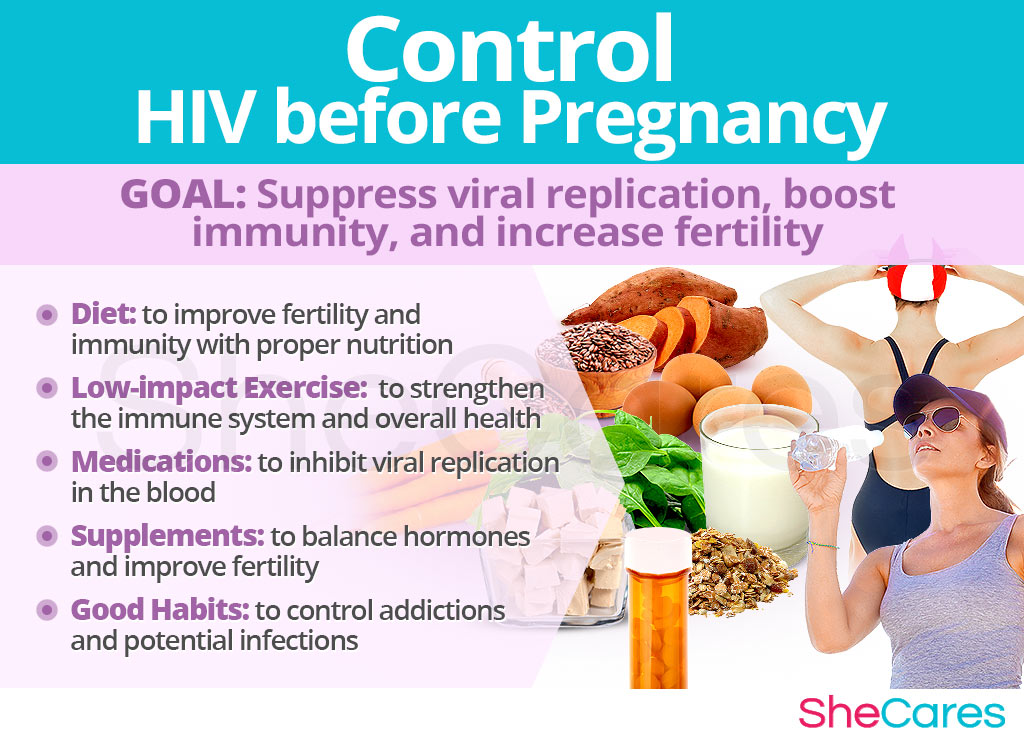
Tips for Conceiving with HIV
When your viral load and CD4 cell count are at the desired level, you might begin attempting to conceive.
- Focus on stress-reduction practices, such as a hobby, listening to music, or reading books.
- Build a strong network of family and friends you can rely on when in need.
- Switch to ovulation-boosting foods, such as dried beans, nuts, seeds, and high-fat dairy.
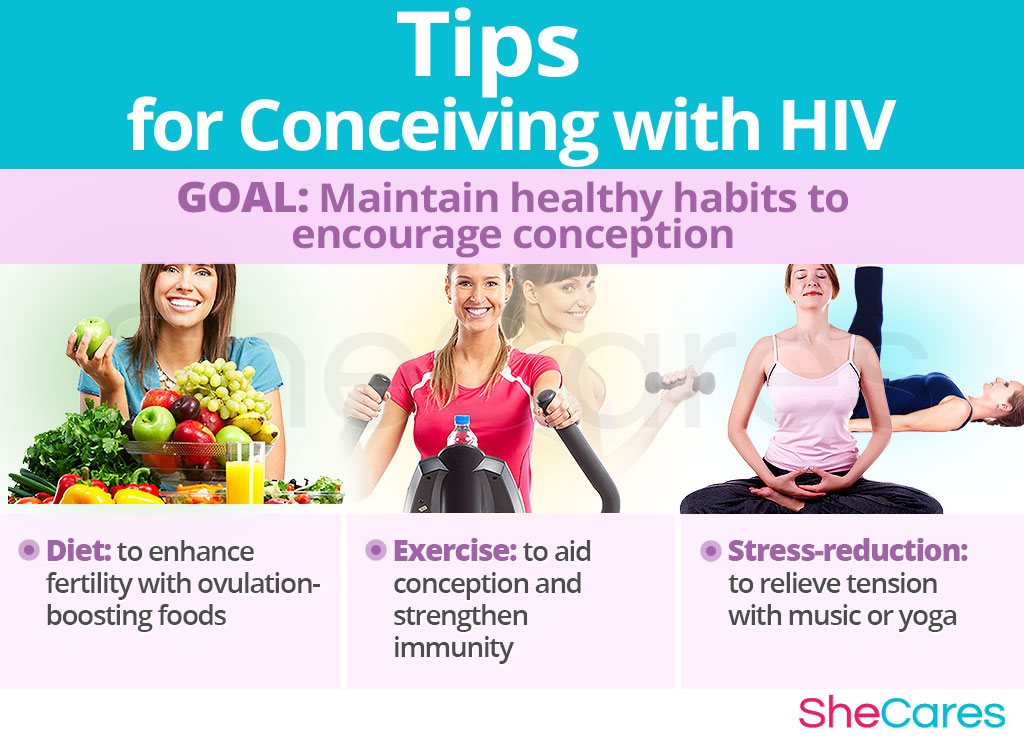
Manage HIV during Pregnancy
Management of HIV in pregnancy requires a continuation of antiretroviral treatment and thorough monitoring of the virus.
Adhere to your medication regimen without skipping any doses.
Let your OBGYN know if you suffer from morning sickness, which is common in early pregnancy and may cause disturbance to proper ARVs absorption.
Stay away from large crowds, especially during winter months, to prevent infection.
Keep good hygiene by washing your hands frequently.
In many cases, pregnant women with HIV undergo a cesarean delivery to prevent the viral transmission during labor. Babies born to HIV positive mothers are generally put on ARVs for 4 to 8 weeks to prevent the virus from replicating. Women are also advised against breastfeeding as HIV can be transmitted through breast milk.
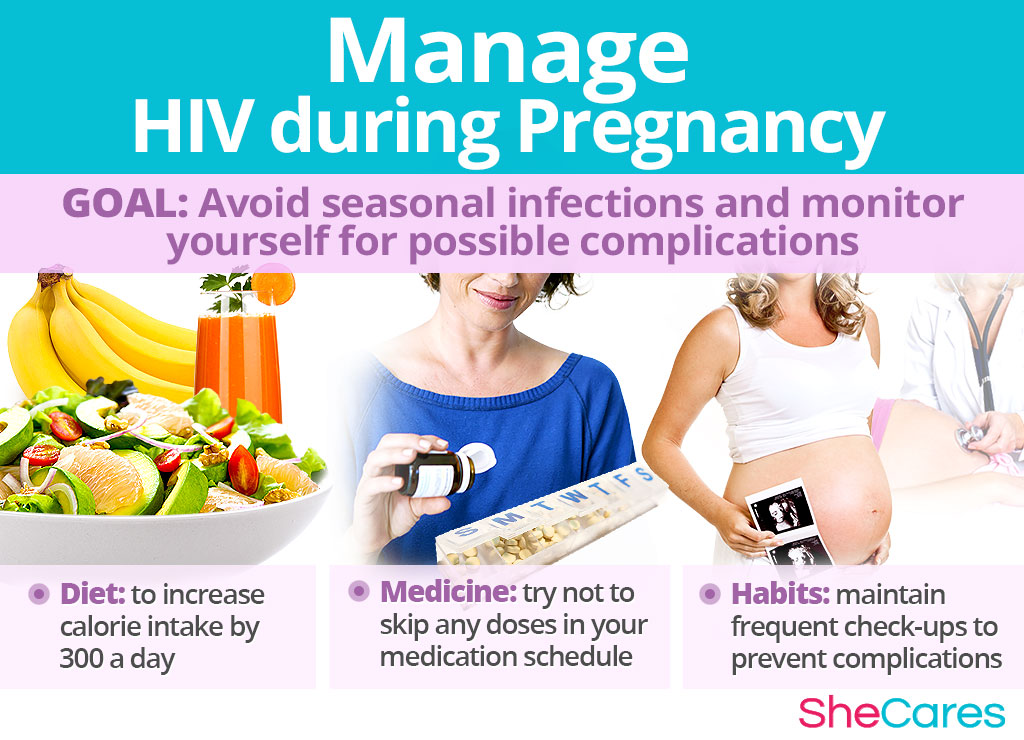
Key Takeaways
Once a debilitating condition, an infection with human immunodeficiency virus has become much more manageable in the recent years. Although HIV during pregnancy continues to present serious challenges both for the mother and the fetus, modern pharmaceutical treatments with ARVs as well as immune-supporting lifestyle habits and supplements, like Macafem, can reduce the risk of mother-to-child transmission and enable women to become mothers of healthy infants.
Sources
- AIDS Info. (2017). Preventing Mother-to-Child Transmission of HIV. Retrieved December 8, 2017 from https://aidsinfo.nih.gov/understanding-hiv-aids/fact-sheets/20/50/preventing-mother-to-child-transmission-of-hiv
- AIDS Education & Training Center Program. (2014). Care of HIV-Infected Pregnant Women. Retrieved December 8, 2017 from https://www.aidsetc.org/guide/care-hiv-infected-pregnant-women
- American Pregnancy. (2017). HIV/AIDS During Pregnancy. Retrieved December 8, 2017 from http://americanpregnancy.org/pregnancy-complications/hiv-aids-during-pregnancy/
- Better Health. (2017). HIV and women - having children. Retrieved December 8, 2017 from https://www.betterhealth.vic.gov.au/health/conditionsandtreatments/HIV-and-women-having-children
- U.S. Food and Drug Administration. (2017). Women and HIV: Get the Facts on HIV Testing, Prevention, and Treatment. Retrieved December 8, 2017 from https://www.fda.gov/ForConsumers/ByAudience/ForWomen/ucm118579.htm
- CDC. (2017). HIV Among Pregnant Women, Infants, and Children. Retrieved December 8, 2017 from https://www.cdc.gov/hiv/group/gender/pregnantwomen/index.html
- Fertility and Sterility. (2011). HIV/AIDS and Infertility: Emerging Problems in the Era of Highly Active Antiretrovirals. Retrieved December 8, 2017 from https://www.ncbi.nlm.nih.gov/pmc/articles/PMC3165097/
- Medline Plus. (n.d.). HIV/AIDS and Pregnancy. Retrieved December 8, 2017 from https://medlineplus.gov/hivaidsandpregnancy.html
- Women's Health. (2017). Pregnancy and HIV. Retrieved December 8, 2017 from https://www.womenshealth.gov/hiv-and-aids/living-hiv/pregnancy-and-hiv
